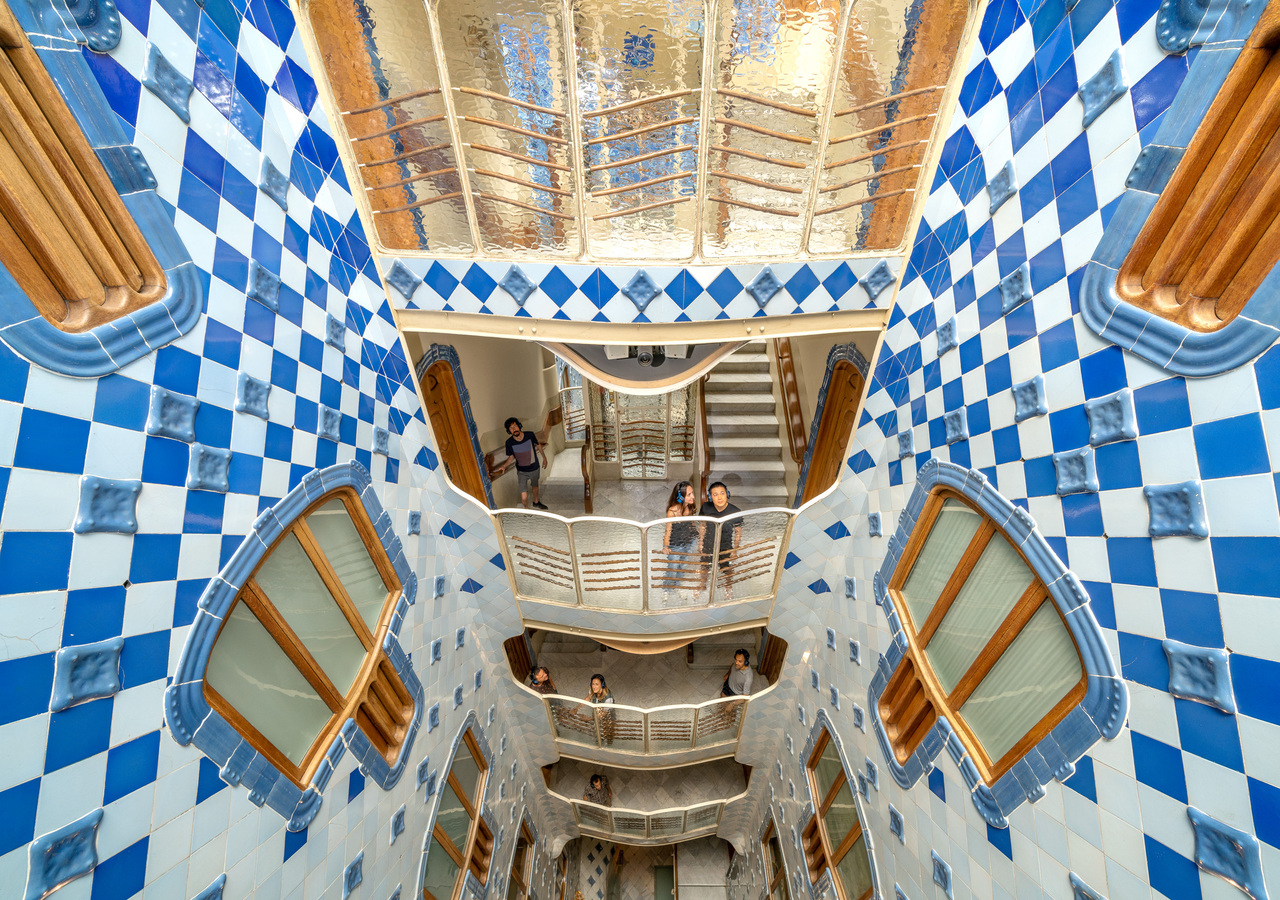The Catalonian capital, Barcelona, is a city with a broad and rich cultural landscape. One of the best things about visiting such a historical city is that its history is prevalent on the surface – the architecture, the colors and the landmarks. From Gaudí to Picasso, the city has been touched by many geniuses. Luckily, it’s very easy to soak in the work of these geniuses upon a weekend or short visit, which is why we have put together a piece on 5 worthwhile sites to add to your itinerary.
Casa Batlló: A Dive into Gaudí’s Genius
Among the city’s many gems, Casa Batlló stands out as an iconic masterpiece. Designed by Antoni Gaudí, the legendary Catalonian architect, the building is a testament to the richness of Modernist architectural details. Characterized by its vibrant ceramic tiles, organic forms and intricate carvings, it goes beyond being just a building… it’s a sculpture that you can walk through.
The façade itself is often interpreted as a tribute to Saint George, the patron saint of Catalonia, symbolizing the eternal struggle between good and evil. If it couldn’t get any more impressive, this very site won a recent award for the best international exhibition of the year 2022.
Casa Batlló’s groundbreaking museographic proposal seamlessly blends the old with the new. As you walk through the building, Augmented Reality Tablets are present to enhance your experience, offering deeper insights into Gaudí’s creative process. Immersive rooms and captivating audiovisual productions further amplify the aura of the masterpiece.
The Gothic Quarter: A Journey Back in Time
Stepping into Barcelona’s Gothic Quarter is akin to being transported to a different era. This is perhaps the most famous area in Barcelona (so get there early). This medieval maze of narrow, winding streets, hidden squares and centuries-old buildings offers an immersive experience. The Barcelona Cathedral, with its ornate spires and intricate Gothic details serves as the central piece that anchors this historic district. Quite literally, if you lose your friend or partner – just say to meet there.
The Quarter is also home to the Plaça del Rei, a square laden in historical significance. Here you can explore the underground Roman ruins at the City History Museum, which offer a fascinating glimpse into Barcelona’s early foundations. Of course, you can get some shopping in with numerous artisan shops and cafés that line the cobblestone streets, bringing a bit of modern day decadence to the area.
Montjuïc Castle: Military Stronghold to a Public Space
Perched on top of Montjuïc hill, this castle was once a military fortress with a volatile past that includes periods as a royal residence and as a prison. In modern times, it has been transformed into a cultural hub offering panoramic views of the city and the harbor. It was also a site for anti-aircraft guns during the Spanish Civil War, making this a fascinating place to learn about. A house, prison and fortress?
Today, the castle serves not just as a tourist attraction but also as a space for public discourse, hosting frequent exhibitions, cultural events and even open-air cinema nights during the summer – so it’s still creating history. The transformation of this space, from a symbol of repression to a public cultural venue, perfectly captures the spirit of Barcelona.
Park Güell: A Mosaic Wonderland
Another masterpiece by Antoni Gaudí, Park Güell is a public park that combines natural elements with inspired architecture. One of its most iconic elements is the ceramic mosaic salamander, affectionately known as “El Drac,” situated near the main entrance. The park was initially conceived as a residential project but was later transformed into a public space. Its serpentine bench, covered in colorful tiles, offers not only a place to rest but also a vantage point to absorb the views of the park and the city.
Museu Picasso: The Early Years of a Genius
The Museu Picasso is an indispensable part of Barcelona’s culture. Located in five adjoining medieval palaces, this museum houses one of the most comprehensive collections of artworks by the 20th-century Spanish artist Pablo Picasso. With a focus on his early years, the museum provides a unique glimpse into the formative period of the artist, offering insights into how his style evolved over time.
With over 4,000 works exhibited, ranging from his famous Blue Period to his lesser-known ceramics, the museum is not only a treasure for art enthusiasts but also serves as a fascinating introduction for those unfamiliar with Picasso’s work. The arrangement of the galleries offers a nuanced understanding of his artistry, making it a worthy visit for most travelers.
Final Word
Barcelona is a city that constantly blends the traditional with the modern. There is no shortage of history and exhibits, just as there’s no shortage of modern cafes, shops and urban activities too. Ultimately, it’s an ideal place for those interested in culture and history, and it’s possible to pack in plenty during a short trip.
